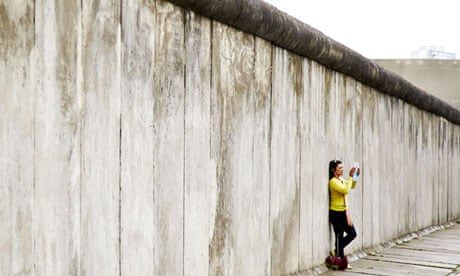At a wedding last week, I was sitting next to a novelist who was writing about the cold war, so I told her the story of how the Secret Intelligence Service thanked all its agents in East Germany after the fall of the Berlin Wall. It is a moving story from another age and I know it to be true.
As Germany approached unification, Her Majesty's government authorised payments of – I believe – 30,000 DM (£10,200) to all the agents who had risked life and liberty to help MI6. A team of intelligence officers was deployed to track down former agents, or their families, and present the cheque with the government's gratitude. It was a long and emotional job, for the young officers heard many agonising stories about loss, sacrifice and years spent in prison.
At length, there was one individual left on the list. He arrived at MI6's office on the main thoroughfare of Unter den Linden, in the old East Berlin, but instead of taking the money, he rushed out back on to the street, pursued by one of the spies with the cheque. He rejected it for a second time, gesturing frantically towards the Brandenburg Gate. Didn't the British government understand that he'd done it all so that his children could walk through the gate as free citizens?
This captures a lot about the times that formed my political beliefs, as well as the miracle of the 1989 liberation. During the cold war, we valued freedom and privacy because we compared our lives to the tyrannical conditions in the Communist bloc. Whatever the faults of western societies, we knew we were better than those societies and we knew that we were right .
The story has been playing in my mind recently, because all summer I have been puzzling over the lack of reaction in Britain to the Snowden revelations about US and UK communications surveillance, a lack that at some moments has seemed even more remarkable than the revelations themselves. Today, apparently, we are at ease with a system of near total intrusion that would have horrified every adult Briton 25 years ago. Back then, western spies acknowledged the importance of freedom by honouring the survivors of those networks; now, they spy on their own people.
We have changed, that is obvious, and, to be honest, I wonder whether I, and others who care about privacy and freedom, have been left behind by societies that accept surveillance as a part of the sophisticated world we live in. Even so, the neglect of the Snowden story by the British media does seem remarkable.
Last Friday, the order on the Today programme's 8am news bulletin, usually a reliable guide to developments at home and abroad, was as follows. Putin remains adamant on Syria at G8. Blair on Syrian intervention. The plight of Syrian refugees. Nursing regulator calls for checks on nurses. Former BBC DG accuses BBC trust of dishonesty. A phone recording from the recent Spanish rail crash. Parliamentary committee accuses civil servants of incompetence. China discovers that many Chinese cannot speak Mandarin properly. Water voles in the UK are in drastic decline.
Not a mention of the story leading two of the world's most influential newspapers – the New York Times and the Guardian – which revealed that the British and American governments have compromised the encryption used by internet companies to protect consumers' information, their banking details, medical records and every form of communication. The Mandarin and water vole items apparently count for more than the news that the NSA and GCHQ have secretly collaborated with technology and internet giants to gain near total access to our online lives.
Even though the BBC seems more timid and subservient to authority than it has for decades, it's surprising that its journalists did not understand the enormous implications of this story. Were they obeying government requests that it should not be used? Or did they ignore it because it seemed unimportant? Whatever is the answer, we can be in no doubt that it was journalistic fecklessness for the corporation only to acknowledge these significant revelations in a down-page item on its website. Today plays a huge role in setting the daily agenda, but as far as the programme was concerned, this important story did not exist. And that gave succour to the newspapers that also ignored the revelations, almost certainly at the government's request.
The BBC may have succumbed to the chill surrounding the Snowden story. Three weeks ago, after the partner of one of the principal journalists writing about Snowden in the Guardian was detained under terror laws at Heathrow, I did four or five interviews with the BBC. In most, the interviewer displayed not simply a remarkable lack of knowledge about the Snowden affair, which had been going on for over two months, but a kind of reserve or squeamishness about discussing these matters on air. It's hard to put your finger on it, but that's what a chill feels like.
The debate has been stifled in Britain more successfully than anywhere else in the free world and, astonishingly, this has been with the compliance of a media and public that regard their attachment to liberty to be a matter of genetic inheritance. So maybe it is best for me to accept that the BBC, together with most of the newspapers, has moved with society, leaving me behind with a few old privacy-loving codgers, wondering about the cause of this shift in attitudes. Is it simply the fear of terror and paedophiles? Are we so overwhelmed by the power of the surveillance agencies that we feel we can't do anything? Or is it that we have forgotten how precious and rare truly free societies are in history.
Complacency is a big part of the failure of the response to Snowden and the fact that no senior politician has raised concerns and no political party has provided any leadership is worrying. It is true that the whole elaborate apparatus seems like a phantasm and few can attest to experiencing the intrusion, because when it happens it is as painless as a mosquito bite.
But this does not stop these developments representing a fundamental threat to our society, one that all those brave agents in East Germany would understand in an instant. They would tell you that this is not about the much-denigrated quality of privacy, but about political power. What the Guardian-New York Times stories of last week tell us is that we are much less free than we supposed and that unrestricted surveillance will become a menace to us all. That should be a vital concern for journalists, even at the BBC.







